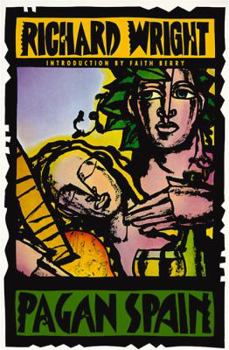Pagan Spain
Select Format
Select Condition 
Book Overview
A master chronicler of the African-American experience, Richard Wright brilliantly expanded his literary horizons with Pagan Spain , originally published in 1957. An amalgam of expert travel reportage, dramatic monologue, and arresting sociological critique, Pagan Spain serves as a pointed and still-relevant commentary on the grave human dangers of oppression and governmental corruption. The Spain Richard Wright visited in the mid-twentieth century...
Format:Paperback
Language:English
ISBN:0060925655
ISBN13:9780060925659
Release Date:March 1995
Publisher:Harper Perennial
Length:320 Pages
Weight:0.55 lbs.
Dimensions:0.8" x 5.3" x 8.0"
Related Subjects
Africa African-American & Black African-American Studies Americas Ancient Early Civilization Ethnic & National Europe General History Literary Literary Criticism & Collections Literature Literature & Fiction Modern (16th-21st Centuries) Politics & Social Sciences Portugal Social Science Social Sciences Spain Specific Demographics Travel Travel Writing WorldCustomer Reviews
3 ratings
A different perspective
Published by Thriftbooks.com User , 18 years ago
Spain fascinates me for some of the same reasons that intrigued Richard Wright when he wrote this book a few years before his untimely death. Wright ascertains that Spain is a contradiction,a holy nation that does ungodly acts, a superpower from the past trying to find its way in the modern world. Wright's main issue is exploring religion, namely Roman Catholism but along the way divulges his insights into a society plagued by it's past and present which at the time(1954)was still under Franco's influence. One of the more interesting aspects of this book is his discovery of a little book all young women must read and memorize. It turns out to be a sort of indoctrination to being "Spanish." Take an excerpt from Chapter 1, "Spain is a historical unit with a specific role to play in the world." This role is tied to religion and the conversion of all, by any means neccessary as exemplified with the conquest of the Americas; the gold and riches were just a by product of the divine nature of the conquest, a sort of earthly reward. Further on in the book destiny is defined as "all men in a common movement for salvation." In essence the belief is that Spain although no longer a superpower will be fundamental in the salvation of the world.Wright reads chapters of the book throughout his travels and shares them with the reader. Some of the Falangist concepts about Imperial Spain and how it pertains to the current state of affairs is amazing in it's ethnocentrism. The ideas from the Falangist book are worth reading this book for alone. Along his travels Wright sees the contradictions everywhere, racism, sexism and exploitation of women is rampant but sex sells, for it's price. So much for the high morality. One section is entitled " Sex , Flamenco and Prostitutuion" in which he explores this part of Spain that goes against the teachings of the church. Wright tries to live the life as regular people do and see it through their eyes. He buys a poor family a ticket to the bullfights and learns more lessons and observations on Spanish life. I found this book hard to put down and read it over a few brief settings while listening to Rodrigo's "Concierto de Aranjuez" as interpreted by Miles Davis on "Sketches of Spain". The material is fascinating and makes you think about many things especially if you happen to have Spanish heritage in your veins somewhere. Highly insightful and worth reading for the perspective of an outsider. Recommended reading from high school to adult although it might offend some Catholics.
Refreshingly Honest
Published by Thriftbooks.com User , 18 years ago
I'm a fan of Wright's but had not heard of this book. It's one of those you start reading and it just fascinates you so you can't put it down. Part travelogue, part social critique, this work of Wright's is refreshing because we see it through the eyes of someone who hasn't be educated or socialized out of believing what he sees. I've always felt that in some places Catholicism is practed in a cult-like way. Wright shows how much power the Church had and what the results were.
Valuable perspective from a visitor/outsider
Published by Thriftbooks.com User , 24 years ago
This book had, says the introduction, been out of print for many years before being briefly republished several years ago. If anyone is able to purchase or obtain this work, they will find it an insightful view into a Spain still largely unknown by and officially protected from America and much of Europe. It was written in the mid-fifties after Wright had taken three journeys to that country. His argument is that Spain is still pagan: a primitive land untouched by the outside world for better or worse. On one hand, the Spanish practice an almost superstitious, certainly paternalist Catholicism which straightjackets women and suspects the few Spaniards daring to practice Protestantism. More positively, Wright finds, Spaniards have no race consciousness derived from outside sources. Wright notes that though obviously of African background, he was not discriminated against in terms of accomodation, dining, or socializing. He talks with a variety of Spaniards. Many question the Franco regime; are anticlerical and sceptical of Spanish values and history. Wright's descriptions of the often intimidating landscape, of bullfights and the celebration of Holy Week in Seville, are excellent. He maintains a basic criticism of the domination of the Church throughout.This brought adverse reaction when the work originally appeared, during an ultra-conservative era when religion was considered a bastion against communism. Wright 's sympathies for Spanish women, be they housewives, prospective brides or prostitutes, is farseeing. He understands the stereotypes women are subject to, especially in such a traditional society.Wright, an ex-communist, still had nostalgic feelings for the fledgling Spanish Republic. The Civil War is a subject only mentioned in confidence to him, so then recent was that struggle. For anyone wishing a broad-minded, well-written portrayal of a country that has fascinated many writers, "Pagan Spain" would be very worthwhile.





